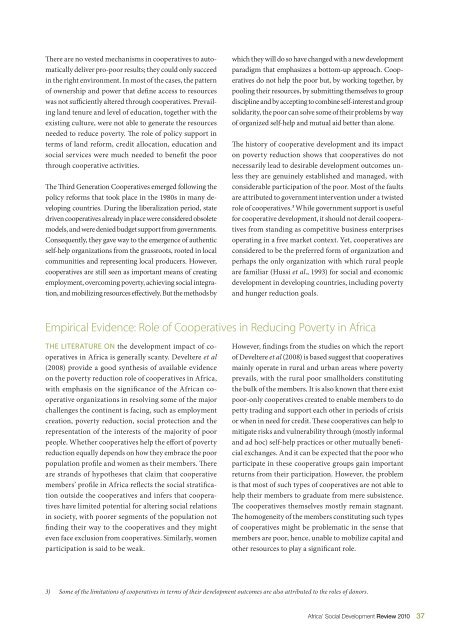The African Social Development Review - United Nations Economic ...
The African Social Development Review - United Nations Economic ...
The African Social Development Review - United Nations Economic ...
Create successful ePaper yourself
Turn your PDF publications into a flip-book with our unique Google optimized e-Paper software.
<strong>The</strong>re are no vested mechanisms in cooperatives to automaticallydeliver pro-poor results; they could only succeedin the right environment. In most of the cases, the patternof ownership and power that define access to resourceswas not sufficiently altered through cooperatives. Prevailingland tenure and level of education, together with theexisting culture, were not able to generate the resourcesneeded to reduce poverty. <strong>The</strong> role of policy support interms of land reform, credit allocation, education andsocial services were much needed to benefit the poorthrough cooperative activities.<strong>The</strong> Third Generation Cooperatives emerged following thepolicy reforms that took place in the 1980s in many developingcountries. During the liberalization period, statedriven cooperatives already in place were considered obsoletemodels, and were denied budget support from governments.Consequently, they gave way to the emergence of authenticself-help organizations from the grassroots, rooted in localcommunities and representing local producers. However,cooperatives are still seen as important means of creatingemployment, overcoming poverty, achieving social integration,and mobilizing resources effectively. But the methods bywhich they will do so have changed with a new developmentparadigm that emphasizes a bottom-up approach. Cooperativesdo not help the poor but, by working together, bypooling their resources, by submitting themselves to groupdiscipline and by accepting to combine self-interest and groupsolidarity, the poor can solve some of their problems by wayof organized self-help and mutual aid better than alone.<strong>The</strong> history of cooperative development and its impacton poverty reduction shows that cooperatives do notnecessarily lead to desirable development outcomes unlessthey are genuinely established and managed, withconsiderable participation of the poor. Most of the faultsare attributed to government intervention under a twistedrole of cooperatives. 3 While government support is usefulfor cooperative development, it should not derail cooperativesfrom standing as competitive business enterprisesoperating in a free market context. Yet, cooperatives areconsidered to be the preferred form of organization andperhaps the only organization with which rural peopleare familiar (Hussi et al., 1993) for social and economicdevelopment in developing countries, including povertyand hunger reduction goals.Empirical Evidence: Role of Cooperatives in Reducing Poverty in AfricaTHE LITERATURE ON the development impact of cooperativesin Africa is generally scanty. Develtere et al(2008) provide a good synthesis of available evidenceon the poverty reduction role of cooperatives in Africa,with emphasis on the significance of the <strong>African</strong> cooperativeorganizations in resolving some of the majorchallenges the continent is facing, such as employmentcreation, poverty reduction, social protection and therepresentation of the interests of the majority of poorpeople. Whether cooperatives help the effort of povertyreduction equally depends on how they embrace the poorpopulation profile and women as their members. <strong>The</strong>reare strands of hypotheses that claim that cooperativemembers’ profile in Africa reflects the social stratificationoutside the cooperatives and infers that cooperativeshave limited potential for altering social relationsin society, with poorer segments of the population notfinding their way to the cooperatives and they mighteven face exclusion from cooperatives. Similarly, womenparticipation is said to be weak.However, findings from the studies on which the reportof Develtere et al (2008) is based suggest that cooperativesmainly operate in rural and urban areas where povertyprevails, with the rural poor smallholders constitutingthe bulk of the members. It is also known that there existpoor-only cooperatives created to enable members to dopetty trading and support each other in periods of crisisor when in need for credit. <strong>The</strong>se cooperatives can help tomitigate risks and vulnerability through (mostly informaland ad hoc) self-help practices or other mutually beneficialexchanges. And it can be expected that the poor whoparticipate in these cooperative groups gain importantreturns from their participation. However, the problemis that most of such types of cooperatives are not able tohelp their members to graduate from mere subsistence.<strong>The</strong> cooperatives themselves mostly remain stagnant.<strong>The</strong> homogeneity of the members constituting such typesof cooperatives might be problematic in the sense thatmembers are poor, hence, unable to mobilize capital andother resources to play a significant role.3) Some of the limitations of cooperatives in terms of their development outcomes are also attributed to the roles of donors.Africa’ <strong>Social</strong> <strong>Development</strong> <strong>Review</strong> 201037
















